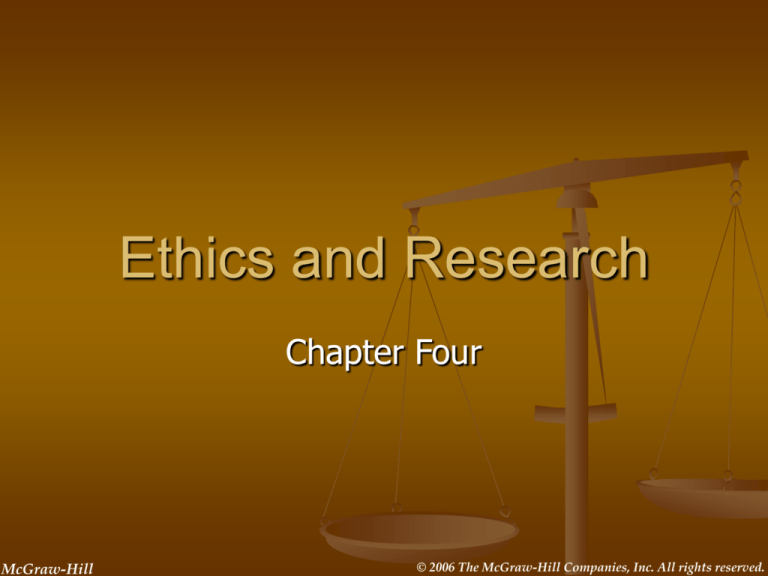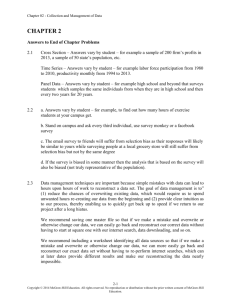
Ethics and Research
Chapter Four
McGraw-Hill
© 2006 The McGraw-Hill Companies, Inc. All rights reserved.
Ethics and Research
Chapter Four
McGraw-Hill
© 2006 The McGraw-Hill Companies, Inc. All rights reserved.
What is Considered Ethical Regarding
Research?
Ethics refers to the question(s) of right and wrong.
Researchers must consider if it is “right” to conduct a
particular study.
The question to ask is: “Will any physical or psychological
harm result from this particular research?”
By practicing ethical procedures, the researcher is doing
“what is right”.
McGraw-Hill
© 2006 The McGraw-Hill Companies, Inc. All rights reserved.
Statement of Ethical Principles
Ethical behavior is defined as conforming to the
standards of conduct of a given profession or group
(Webster’s New World Dictionary).
An agreement among researchers dictates what is
considered right and wrong.
The Statement of Ethical Principles suggests three very
important issues:
The protection of participants from harm
Ensuring confidentiality of the research data
The question of deceptions of subjects
The Statement of Ethical Principles can be found on pp. 93-95
McGraw-Hill
© 2006 The McGraw-Hill Companies, Inc. All rights reserved.
Protecting Participants from Harm
Considered the most important ethical consideration of all the
principles
It is the responsibility of all researchers to ensure that
participants are protected from physical or psychological harm,
discomfort, or danger due to research procedures
Any study that could cause harm should not be considered
Another responsibility of the researcher is to obtain informed
consent from each participant
Three important questions to ask about harm in a study are:
McGraw-Hill
Could people be harmed?
If so, could the study be changed to determine the same
results?
Are the results important enough to cause possible harm?
© 2006 The McGraw-Hill Companies, Inc. All rights reserved.
Ensuring Confidentiality
Once data is collected, researchers should make sure
that no one else has access to the data.
Names of subjects should be removed from all data
forms, if possible.
The researcher should have no knowledge of
particular data linked to a subject.
All subjects should be assured that any data
collected will be held in confidence, as well as that
all participants have the right to withdraw from the
study, if necessary.
McGraw-Hill
© 2006 The McGraw-Hill Companies, Inc. All rights reserved.
Example of a Consent Form: 1 (Figure 4.1)
CONSENT TO SERVE AS A SUBJECT IN RESEARCH
I consent to serve as a subject in the research investigation entitled:
________________________________________________________________
________________________________________________________________
The nature and general purpose of the research procedure and the known
risks involved have been explained to me by ____________________________
The investigator is authorized to proceed on the understanding that I may
terminate my service as a subject at any time I so desire.
I understand the known risks are: __________________________________
________________________________________________________________
________________________________________________________________
I understand also that it is not possible to identify all potential risks in an experimental procedure,
and I believe that reasonable safeguards have been taken to minimize both the known and the
potentially unknown risks.
Witness _________________________ Signed _________________________
(subject)
Date __________________________
To be retained by the principal investigator
McGraw-Hill
© 2006 The McGraw-Hill Companies, Inc. All rights reserved.
Should Subjects Be Deceived?
Many studies cannot be carried out unless some deception takes
place.
Deception refers to intentionally misinforming the subjects to some
or all aspects of the research topic.
It is often difficult to find situations where observations or
obtainment of certain data can occur at certain specified times.
The possibility of harm could be created from these actions, so the
following guidelines have been developed:
McGraw-Hill
Whenever possible, conduct the study using methods that do not
require deception
If alternative methods cannot be devised, the researcher must
determine if deception is justified by the value obtained
If participants are deceived, the researcher must ensure that the
participants are provided with sufficient explanation as soon as
possible
© 2006 The McGraw-Hill Companies, Inc. All rights reserved.
Examples of Unethical Research Practices (Figure 4.2)
McGraw-Hill
© 2006 The McGraw-Hill Companies, Inc. All rights reserved.
Research With Children
Studies using children as participants present some special issues for
researchers.
The young are more vulnerable, have fewer legal rights, and may
not understand the language of informed consent.
The following guidelines below need to be considered:
McGraw-Hill
Informed consent of the parents or guardians is required regarding the
use of minors as subjects
Researchers do not present themselves as diagnosticians or counselors
in reporting results to parents, nor do they report information given by
children in confidence
Children may never be coerced into participation in any study
Any form of remuneration for the child’s services does not affect the
application of these ethical principles
© 2006 The McGraw-Hill Companies, Inc. All rights reserved.
Example of a Consent Form: 2 (Figure 4.3)
AUTHORIZATION FOR A MINOR TO SERVE
AS A SUBJECT IN RESEARCH
I authorize the service of ____________________________________ as a subject
in the research investigation entitled:____________________________________
__________________________________________________________________
__________________________________________________________________
The nature and general purpose of the research procedure and the known
risks involved have been explained to me. I understand that __________________
(name of minor)
will be given a preservice explanation of the research and that he/she may decline
to serve. Further, I understand that he/she may terminate his/her service in this
research at any time he/she so desires.
I understand the known risks are: __________________________________
_________________________________________________________________
_________________________________________________________________
I understand also that it is not possible to identify all potential risks in an
experimental procedure, and I believe that reasonable safeguards have been
taken to minimize both the known and the potential but unknown risks.
I agree further to indemnify and hold harmless S.F. State University and its
agents and employees from any and all liability, actions, or causes of actions that
may accrue to the subject minor as a result of his/her activities for which this
consent is granted.
Witness _________________________ Signed _________________________
(parent or guardian)
Date __________________________
To be retained by the principal investigator
McGraw-Hill
© 2006 The McGraw-Hill Companies, Inc. All rights reserved.
Regulation of Research
Research involving the use of human subjects is difficult to
conduct.
Before any research commences, the research must be
approved by the (IRB) Institutional Review Board at the
institution.
The review takes place regardless of the number of researchers
or who is financing the project.
The IRB is in charge of weighing the risks of subjects, checking
informed consents, and the treatment of subjects.
Once the research has been approved, the researcher must
obtain a group of subjects who are willing to participate in the
study.
McGraw-Hill
© 2006 The McGraw-Hill Companies, Inc. All rights reserved.
Department of Health and Human Services
Revised Regulations
for Research with Human Subjects
The revised guidelines exempt many projects
from regulations by the HHS (Health and
Human Services)
The list of projects now free from the control
of the HHS can be found under “More About
Research” in your text.
Refer to p. 109 in your text
McGraw-Hill
© 2006 The McGraw-Hill Companies, Inc. All rights reserved.







